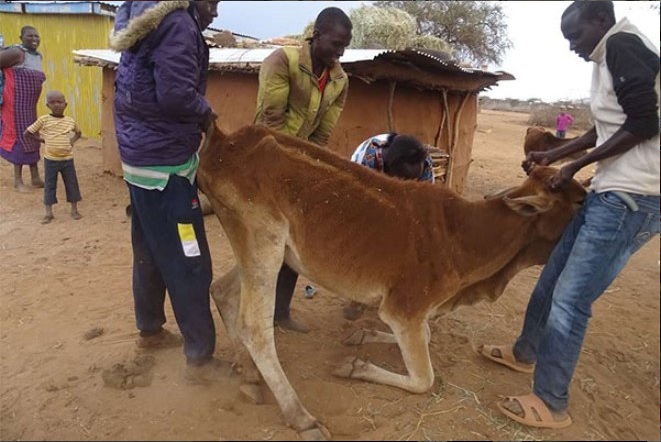
Sunday October 15, 2017

More than 50 cows grace Evelyn Naisenge’s homestead in Olkiloriti Location in Kajiado Central, but her two young children take a packet milk when they return home from school.
The cows are too weak to be milked, owing to the debilitating drought that has hit Kajiado County for the past eight months.
The National Drought Management Authority (NDMA) has put the drought situation in the county at “alarming level”, a step away from “emergency condition”.
Most of the cows at Naisenge’s homestead have been moved away in search of pasture.
TOO WEAK
Ideally, the cows left at home should provide milk for domestic use, but they are too weak to do so. Some are unable to stand on their own.
When we visited her village, Naisenge had gone to the local church where the most affected families were receiving animal feed from the NDMA.
This was basically a 50kg bag of pellets rich in proteins and carbohydrates. Back at her home, two cows lay on the ground, unable to move. “They are not sick... they are just hungry.”
According to Mr Omar Abdi, the Kajiado NDMA coordinator, every household has lost an average of two to three cows to the drought.
ECONOMIC MAINSTAY
“It is alarming, considering that livestock keeping is the economic mainstay of the Maasai in Kajiado. The livestock market is almost collapsing,” he said.
The NDMA has teamed up with the European Union to save the most vulnerable households from the ravages of drought.
They are distributing highly nutritious livestock feed supplements for affected animals, and fuel subsidies for boreholes that pump water for domestic and animal use.
They are also supporting vaccination services. “During the dry season, there is a lot of migration of animals in search of pasture. Some cross the border into Tanzania,” explained Dr George Wakhungu, a veterinary officer manning the Namanga border point.
INTERVENTION
“The animals are likely to pick up diseases, which get exacerbated by hunger,” he added.
Welcome as the intervention measures by NDMA and EU are, the residents say they are not enough.
Many of them are taking their weak cows to Bisil slaughterhouse and selling them at throw-away prices.
Cases have been reported of desperate residents selling cows for a paltry Sh500. “Some farmers have been pushed to the wall,” says Mr Joseph Leseiyo, chief of Endoinyo Enkampi location. “They will take any price to avoid the cows dying in their hands.”
SLIGHT CHANGE
However, by Friday, the situation had changed slightly as some areas in Kajiado had received rainfall. “As much as the cows are in bad shape, the farmers are now quoting higher prices for them.
A cow that would previously have gone for Sh1,000 or less is now selling at Sh3,000 and above.
For them, it’s just a matter of time before the rains fall.” The sale prices are still low, considering that during better times, a healthy cow goes for an average of Sh40,000.
Kajiado Governor Joseph ole Lenku, while officially opening the County Assembly, said about 130,000 households and over 600,000 cattle were at risk of starvation and death.
SEVERE DROUGHT
“Areas such as Mailuwa, Lenkisim, Poka, Imbirikani, Purko, Maparasha, Shompole, Mosiro, Dalalekutuk, Mile 46, Meto, Ildamat, Kitengela West and settlements surrounding Isinya are experiencing severe drought,” said Mr Lenku.
Human wildlife conflict is common, as farmers drive their animals into wildlife parks in search of pasture.
Wild animals, on the other hand, raid homes, killing sheep and goats. In some instances, elephants have attacked humans, with deaths and injuries reported.
The Kenya Wildlife Service (KWS) responded by rounding up livestock that had encroached on game parks, eliciting furious reaction from Mr Lenku.
COMPENSATION
The governor said little or no compensation had been given for people killed or maimed by wildlife.
He also warned KWS officers against beating up young men found grazing animals in game parks and threatened to mobilise the people to hunt the wildlife for food.
The KWS seems to have relaxed its rules and is allowing livestock to graze in parks up to 3pm.